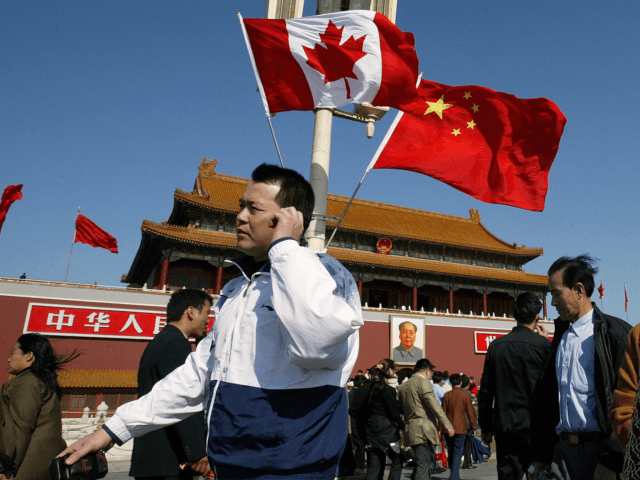The Canadian government has proposed a two-year prohibition on foreigners buying real estate in a potential shot across the bow against Communist China.
In the budget announced by the Minister of Finance of Canada, Chrystia Freeland, the government has proposed banning foreign buyers from scooping up more real estate in the country under the pretence of reducing the soaring cost of housing.
The Winnipeg Sun reported that over the past two years, alone, housing prices in Canada have jumped by over 50 per cent.
The newspaper said that February saw the single highest increase in the nation’s history ahead of the interest rate hike by the Bank of Canada, which saw the housing benchmark price reach C$869,300 (£531,300/$693,000).
On top of the prohibition on foreign buyers, the government will also attempt to cool the housing market by investing billions into new construction projects and introducing a tax-free savings account for first-time home buyers, the BBC reported.
Unlike the Federal Reserve in the United States, Canada’s central bank does not consistently provide statistics on foreign ownership of property. However, according to a study from the Bank of Canada in 2016, Chinese buyers accounted for nearly a third of real estate spending in Vancouver in 2015, spending $9.9 billion.
At the time, financial analyst Peter Routledge, who compiled the data, reported that Chinese buyers also accounted for 14 per cent — $7 billion — of the total real estate sales in Toronto.
Justin Trudeau has followed in his father Pierre's footsteps in supporting communist China, Peter Schweizer writes in "Red-Handed." https://t.co/fIEQ4WKCCe
— Breitbart News (@BreitbartNews) February 2, 2022
Chinese investment has decreased over the past two years in the wake of a clampdown by Beijing on real estate firms following the communist country’s property crisis, as the Shenzhen-based firm Evergrande failed to pay its debts after buying up huge swaths of empty apartment blocks on the expectation of continual growth in the sector.
However, the ban on foreign buyers will likely still concern many wealthy and often CCP-tied individuals in China, who use overseas property as a hedge against the yuan as well as to protect their financial assets from being seized by the communist regime.
Indeed, it is technically impossible to purchase property in China, as all land is owned by the state. Under the system, citizens may only lease the land for a period of up to 70 years from the state, thereby forcing many wealthy Chinese to look towards Western nations, such as Canada, to invest in property.
In the budget released on Thursday, there is a critical loophole left open for Chinese investors to continue buying up property, however, as an exemption was made for foreign students.
Chinese students are the second-largest group of foreigners studying in Canada, only behind India, with approximately 116,000 Chinese studying in the country as of 2020.
Even state media in China has been critical over alleged “students” purchasing multimillion-dollar mansions in Canada. In 2016, for example, China’s state news agency Xinhua criticised the purchase of a $24 million mansion in Vancouver, claiming that the “real estate markets of the United States, Canada, Australia, and other countries are very prone to become hotbeds for international money laundering.”
One reason for such high-profile purchases might have been a response to Chinese dictator Xi Jingping’s “anti-corruption” purge of political rivals within the CCP, forcing many opponents of the Xi regime to seek safety abroad.
Far-left Canadian Prime Minister Justin Trudeau, under fire for his poor handling his country’s anti-mandate protests, praised China’s dictatorship in a resurfaced video from 2013. https://t.co/FCqTAgMVq7
— Breitbart News (@BreitbartNews) February 20, 2022
There are some doubts over whether the move to ban foreign buyers will have a meaningful impact on soaring housing prices in Canada, with Ben Myers of Bullpen Research & Consulting in Toronto noting the decline in foreign investment since 2020.
“It’s a fairly low number and let’s face it, the people that really want to buy … are going to find alternative ways to do it,” he told the BBC.
Yet, the move from Justin Trudeau government is intriguing, given the liberal leader previously professed his admiration for the communist system in China.
The proposal may have been prompted by regional moves to combat Canadian property prices, however, with Ontario’s Premier Doug Ford — of the Progressive Conservative Party which rivals Trudeau’s Liberals — announcing plans to raise the tax on foreign buyers from 15 to 20 per cent throughout his province, for example.
Justin Trudeau Strikes Deal with Far-Left to Remain in Power Until 2025https://t.co/CrffRsW8Sj
— Breitbart London (@BreitbartLondon) March 22, 2022
Follow Kurt Zindulka on Twitter here @KurtZindulka

COMMENTS
Please let us know if you're having issues with commenting.